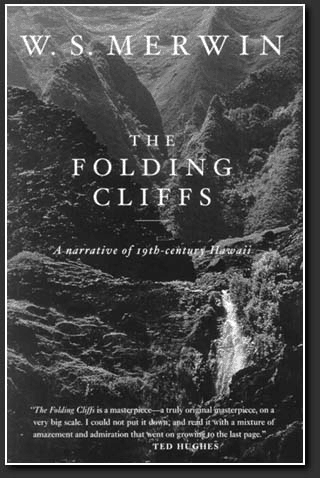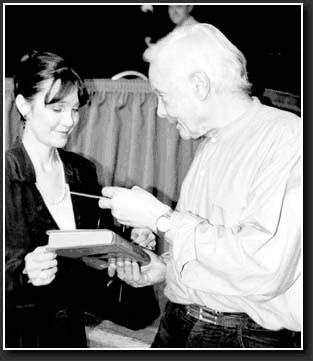|
|
|||||||||
 |
|||||||||
|
|
|||||||||
|
|
|||||||||
|
|
|
A Man of Some Importance
![[Picture]](12_1_i.gif)
When poet and Pulitzer Prize-winner W.S. Merwin visited the UA campus Friday, Sept. 18, it wasn't just a reading; it was an experience. Merwin packed the Arizona Ballroom in the Memorial Student Union. There was seating for 500 guests, and there were still people standing against the walls and sitting on the wooden dance floor. The reading attracted other big-name poets. Gerald Stern, a faculty member of the Iowa Writer's Workshop, came out from New Jersey. Tony Hoagland drove from New Mexico State University in Las Cruces. "I'll go anywhere to see Merwin," Hoagland told me. The University of Arizona Poetry Center hosted an open question and answer session with Merwin. This was a rare chance to get up close with one of the major figures in contemporary poetry. Merwin is a slim man in his early 70s, with full, white, nearly silver hair, and a kind face. The poetic grandfather of us all, he's one of the poetry world's tribal elders. His mere presence is commanding. Alison Deming, director of the Poetry Center, opened up the session by asking Merwin about his newest collection of poetry, The Folding Cliffs (Knopf). This new book is in the form of an epic poem, a return to the ideas of oral tradition. It's the story of 19th century Hawaii told in lush, poetic language. "I came across the story, or what I thought was the story a few years ago," Merwin explained. "It concerns mainly three people: a man and wife and their 10-year-old child." The book chronicles the story of this family during the outbreaks of leprosy in the Hawaiian Islands. People who contracted the disease were separated from their families, often by legal decree, often by force. "In Hawaiian, the disease is called the separating disease," Merwin said. "This is a story of people who said 'no more.' This is a story that serves as an example that we are not moral slaves; these people decided they were not going to be separated, that they were going to be free." Merwin was asked about the inclusion of Hawaiian names and language in the book. "Well, people still read War and Peace, and no one complains about the Russian names," he smiled. When asked about his formal decisions in the book, Merwin said, "I never really think of that - using pentameter - it's pure artifice, an English attempt to mimic French and Italian writers working a metered form. I wanted something flexible. The long line - the elegiac line - seemed most appropriate. It's a free and fluid line that allows for formality and informality. It's hard to write a book-length poem today in the shadow of [Ezra Pound's] Cantos and [William Carlos Williams'] Patterson."
"Everything," Merwin smiled. "Let me put it in the terms of the Christian ideal of resurrection. At what point in your life do you get to resurrect, to transcend? Poetry is the everlasting self, [the Japanese poet] Basho said." Merwin had suddenly shifted from talking as a poet to talking as a modern day mystic - something like Kung-Fu meets PBS. A question about the use of silence in Merwin's work was asked- what is his intent in the silence? "I hope that you're listening," he responded. "The silence is an enormous subject that we don't really deal with directly. Silence is an approximation of the spiritual." "Poetry comes from paying attention," Merwin later reminded his audience. "Attention is the key to all of life, love, art. It's not complicated - it's miraculous." Then we had cookies and lemonade.
And it was a rock concert. Merwin opened up with some older poems, the highly formal parable of the poem "Yesterday," some other older, shorter pieces. He closed the first set with the title poem from his last book, The Vixen.. Even the poem titles sounded like rock songs. What I noticed first about the reading is Merwin's reading style. It's an incantation, like many of the great poets: Yeats, Pound, Eliot, Lowell - the elevated reading style. The rhythms are almost Latinate, like a priest just after Vatican II. Merwin gave a short introduction to the narrative of The Folding Cliffs, and proceeded with reading selected excerpts from the epic poem. Suddenly it was hard to pay attention to anything but the lush musicality of the language. I was lost as far as the narrative. This is one of the dangers of excerpting an epic poem. The narrative gets tangled along the way. It's harder and harder to pay attention. "Attention is the key," Merwin had said that afternoon. And suddenly I was guilty of my own poetic sabotage. My butt was asleep, there were too many people in this room, my legs weren't comfortable. "It's not complicated - it's miraculous." And I put the complicated out of my mind long enough to pay attention to the last part of the excerpt. And it was moving and it was beautiful. The applause lasted for minutes. The audience got up in various states of elation, confusion and mystification. And it was like a rock concert - it was an experience. |
|
|
|||||
 |
|||||||||

